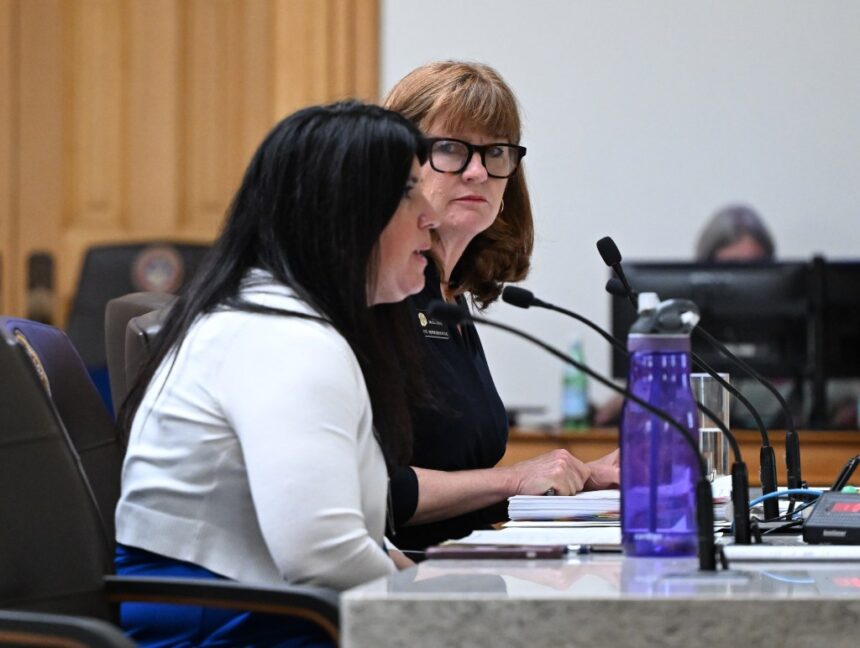Seven votes now separate Colorado Democrats from holding on to their supermajority in the state House.
That’s the margin in Colorado Springs’ House District 16, where Republican challenger Rebecca Keltie appears to have narrowly unseated Democratic Rep. Stephanie Vigil, according to final vote totals released Thursday night. Given the razor-thin margin, out of more than 41,000 votes cast, that race will now head to a recount over the coming weeks.
Heading into the Nov. 5 election, Republicans needed to flip three seats in House Democrats’ seismic 46-seat caucus to break their supermajority control of the chamber, which Democrats won — passing the two-thirds threshold — in the blue wave 2022 election.
GOP candidates have now taken two seats, and barring a surprise shift in District 16’s recount, Keltie’s victory will be enough to nudge Democrats down a peg.
Democratic Rep. Mary Young lost her seat last week in Greeley-based District 50. The race in House District 19, which straddles Boulder and Weld counties’ border, also settled in recount territory in Thursday night’s results, with former Republican Rep. Dan Woog leading Democrat Jillaire McMillan by 123 votes.
But on Friday afternoon, McMillan conceded the race to Woog, who will now return to the legislature after losing the seat in 2022. McMillan had entered the race fewer than 100 days ago after the district’s current representative, Democrat Jennifer Parenti, announced she would not seek reelection.
Minority Leader Rose Pugliese, a Colorado Springs Republican and the party’s top House official, celebrated the results Thursday night.
“Colorado voters spoke loudly, supporting two common-sense leaders in Dan Woog and Rebecca Keltie,” she said in a statement. “After we saw the people of Colorado defeat Prop HH last year and now three House districts flipping back to Republicans, the message is clear: Coloradans want a lower cost of living and a thriving economy. The Democratic policies pushing higher taxes and fees are not the way forward for Coloradans across the state.”
To be sure, Democrats still hold the lion’s share of power in the Capitol. Even if they lose three seats in the House, the chamber will still have 43 Democrats to 22 Republicans. In the Senate, Democrats are similarly one seat away from a supermajority: Democrats and Republicans each flipped one seat last week to maintain the 23-12 status quo in the chamber.
“While we will miss our colleagues who worked tirelessly for their constituents, let’s be clear: the priorities of the MAGA-wing of the GOP will be stopped dead in their tracks by voters who elected an overwhelming majority of legislative Democrats, the second largest Democratic majority since the 1960s,” House Speaker Julie McCluskie said in a statement Friday. She added that Republicans’ “self congratulations ring hollow when they are still walking into the Capitol without a shred of voter support for their extreme agenda.”
She said her door “will always be open to members of the minority party to collaborate where we agree.”
In a statement, Vigil, the incumbent trailing in District 16, said she will honor the final results of the recount.
“I have proudly run a positive, people-centered campaign, and even if we ultimately fall a few votes short, we did it battling an onslaught of dark money attacks, and opposition that relied on conspiracy theories, fear, and division,” she said.
House Democrats also defended other at-risk seats last week, including Rep. Bob Marshall in Douglas County and Rep. Tammy Story in a rural district southwest of metro Denver. Both won tight races.
Still, picking up three House seats was Republicans’ goal heading into Election Day after years of steady declines. They may still be far from a majority, but the flips give Republicans a boost in a Capitol — and state — that has turned bluer for a decade.
Reaching two-thirds control in the House or Senate theoretically makes it easier for a party to override a governor’s veto — though that requires layers of unlikely political maneuvering. The margin also allows for easier passage of constitutional amendments directly to voters.
Last year, Senate Republicans were able to block a constitutional amendment that would’ve been the first step toward allowing victims of years-old sexual abuse to file lawsuits.
Perhaps most critically for a Democratic caucus with active left and moderate wings, the scale of the Democrats’ majority has allowed for debates on a wider variety of policies — though it’s also, at times, proven a challenge for leadership to corral a caucus that has stretched the seams of the party’s big-tent philosophy.
The size of Democrats’ control over the past two years has also given legislators space to lose votes without completely sinking more controversial bills. And committees were more heavily tilted toward Democrats, giving its members’ bills an easier path to the floor.
Amid shifts in the House, the Senate — at times a backstop to a progressive House — is set for its own change.
A group of House Democrats won moves to the Senate last week, and all of them are generally to the left of the term-limited Democrats they’re replacing. They include Reps. Judy Amabile of Boulder and Mike Weissman of Aurora. Amabile has been among the most progressive lawmakers on criminal justice and mental health reforms, and Weissman — who fended off an expensive, dark money-fueled primary challenge — has been particularly influential on consumer protection legislation.
Stay up-to-date with Colorado Politics by signing up for our weekly newsletter, The Spot.
Originally Published:










